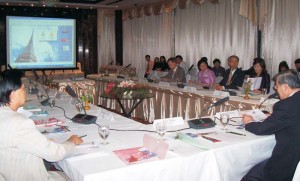 In recent years, several countries in Asia have responded to the global need to constantly upgrade the skills and adaptability of human resource with more imaginative educational expansion that can support an accelerated spread of new technologies in the education system. This has happened through nationaleducation strategies with a focus on integration of ICT in education at all levels. However, counties are still in different stages of this integration, coping with challenges of infrastructure and implementation and bringing all those to imelight in order to initiate the action phase is what the Digital learning Asia 2006 is getting ready to do. And as part of initiating the process, the increasing awareness of governments and communities about the enormous potential of ICTs for fast-forwarding their developmental process and realisation of the undeniable need for mutual learning and knowledge flow, was emphasized in the curtain raiser of Digital learning Asia 2006. The ‘Curtain Raiser Ceremony and First Meeting of the Program Advisory Board’ of the orthcoming Digital Learning Asia 2006 to be held between 26-28 April, 2006 at Rama Gardens Hotel, Bangkok, Thailand was organised on 17 March 2006 at Bangkok by Centre for Science, Development and Media Studies (CSDMS), India in association with Ministry of Information and Communication Technology and Ministry of Education, Royal Thai Government. Held as an evening programme, at the luxurious Lilavadee Room of Rama Gardens Hotel, Bangkok, the ceremony and the meeting drew participation by more than 40 delegates, comprising honourable members of the Program Advisory Board, epresentatives from supporting partners and institutional partners, senior executives and leaders from the IT industry and members of press and media.
In recent years, several countries in Asia have responded to the global need to constantly upgrade the skills and adaptability of human resource with more imaginative educational expansion that can support an accelerated spread of new technologies in the education system. This has happened through nationaleducation strategies with a focus on integration of ICT in education at all levels. However, counties are still in different stages of this integration, coping with challenges of infrastructure and implementation and bringing all those to imelight in order to initiate the action phase is what the Digital learning Asia 2006 is getting ready to do. And as part of initiating the process, the increasing awareness of governments and communities about the enormous potential of ICTs for fast-forwarding their developmental process and realisation of the undeniable need for mutual learning and knowledge flow, was emphasized in the curtain raiser of Digital learning Asia 2006. The ‘Curtain Raiser Ceremony and First Meeting of the Program Advisory Board’ of the orthcoming Digital Learning Asia 2006 to be held between 26-28 April, 2006 at Rama Gardens Hotel, Bangkok, Thailand was organised on 17 March 2006 at Bangkok by Centre for Science, Development and Media Studies (CSDMS), India in association with Ministry of Information and Communication Technology and Ministry of Education, Royal Thai Government. Held as an evening programme, at the luxurious Lilavadee Room of Rama Gardens Hotel, Bangkok, the ceremony and the meeting drew participation by more than 40 delegates, comprising honourable members of the Program Advisory Board, epresentatives from supporting partners and institutional partners, senior executives and leaders from the IT industry and members of press and media.
The programme started with the welcome note by the Chairman of the Program Advisory Board, Kraisorn Pornsutee, Permanent Secretary, Ministry of Information and Communication Technology, Royal Conference Report Thai Government, who laid emphasis on the overriding importance for creating enabling opportunity to encourage new learning paradigms and intellectual networks through platforms like that to be provided by Digital LEARNING Asia.
Speaking on the background of this conference, Ravi Gupta, Director, CSDMS and Convener, Digital Learning Asia 2006 explained the relevance of the event and its commitment towards promoting and advocating ICT-led development of societies across the Asia-Pacific region. Highlighting the remarkable momentum and popularity that this event has already generated for itself across various countries and stakeholders of the region, Mr. Gupta gave a vivid portrayal of the 24 national and international organiations associated with these events in diverse roles and capacities. Following this, he presented the
details of conference programmes, covering each plenary and parallel session, the invited speakers, paper presenters and special workshops of the onference.
An open floor discussion followed thereafter, wherein the members and representatives of the Programme Advisory Board were engaged by the session moderator, the Chairman himself, to invite remarks and suggestions. A good number of valuable inputs did come in, laced with words of inspiration and intent of the industry to provide support for the conference. Though concluded with suggestions, views and ideas, it was not the end of the show. Just left the
Asian gathering to hold their breath for the real show to begin- Digital Learning Asia 2006.






















